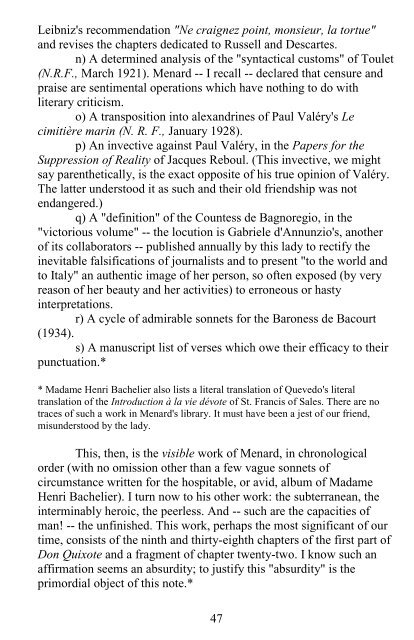Jorge Luis Borges - Labyrinths
Jorge Luis Borges - Labyrinths
Jorge Luis Borges - Labyrinths
Create successful ePaper yourself
Turn your PDF publications into a flip-book with our unique Google optimized e-Paper software.
Leibniz's recommendation "Ne craignez point, monsieur, la tortue"<br />
and revises the chapters dedicated to Russell and Descartes.<br />
n) A determined analysis of the "syntactical customs" of Toulet<br />
(N.R.F., March 1921). Menard -- I recall -- declared that censure and<br />
praise are sentimental operations which have nothing to do with<br />
literary criticism.<br />
o) A transposition into alexandrines of Paul Valéry's Le<br />
cimitière marin (N. R. F., January 1928).<br />
p) An invective against Paul Valéry, in the Papers for the<br />
Suppression of Reality of Jacques Reboul. (This invective, we might<br />
say parenthetically, is the exact opposite of his true opinion of Valéry.<br />
The latter understood it as such and their old friendship was not<br />
endangered.)<br />
q) A "definition" of the Countess de Bagnoregio, in the<br />
"victorious volume" -- the locution is Gabriele d'Annunzio's, another<br />
of its collaborators -- published annually by this lady to rectify the<br />
inevitable falsifications of journalists and to present "to the world and<br />
to Italy" an authentic image of her person, so often exposed (by very<br />
reason of her beauty and her activities) to erroneous or hasty<br />
interpretations.<br />
r) A cycle of admirable sonnets for the Baroness de Bacourt<br />
(1934).<br />
s) A manuscript list of verses which owe their efficacy to their<br />
punctuation.*<br />
* Madame Henri Bachelier also lists a literal translation of Quevedo's literal<br />
translation of the Introduction à la vie dévote of St. Francis of Sales. There are no<br />
traces of such a work in Menard's library. It must have been a jest of our friend,<br />
misunderstood by the lady.<br />
This, then, is the visible work of Menard, in chronological<br />
order (with no omission other than a few vague sonnets of<br />
circumstance written for the hospitable, or avid, album of Madame<br />
Henri Bachelier). I turn now to his other work: the subterranean, the<br />
interminably heroic, the peerless. And -- such are the capacities of<br />
man! -- the unfinished. This work, perhaps the most significant of our<br />
time, consists of the ninth and thirty-eighth chapters of the first part of<br />
Don Quixote and a fragment of chapter twenty-two. I know such an<br />
affirmation seems an absurdity; to justify this "absurdity" is the<br />
primordial object of this note.*<br />
47


